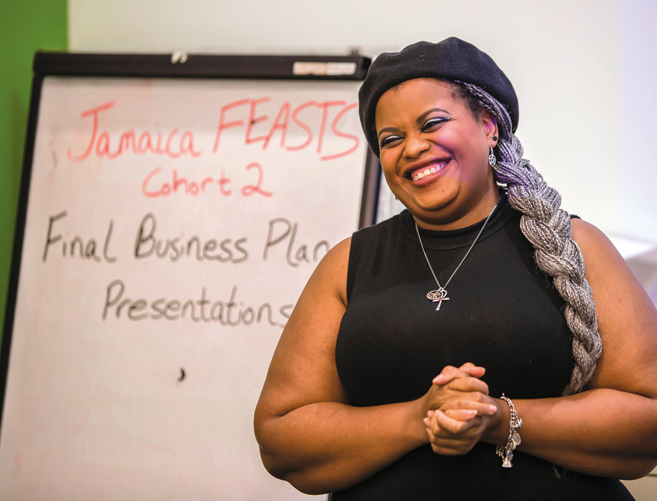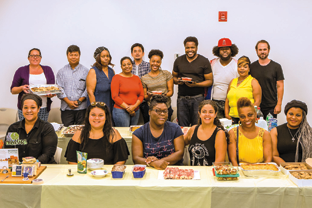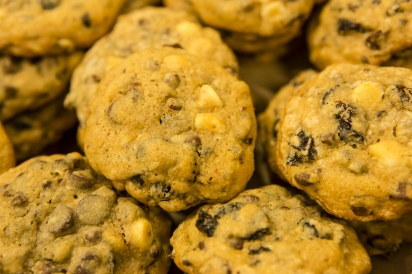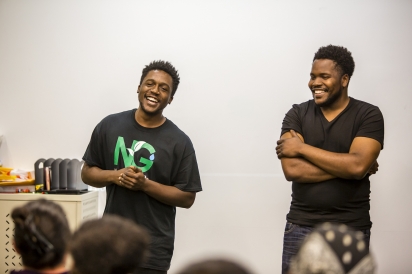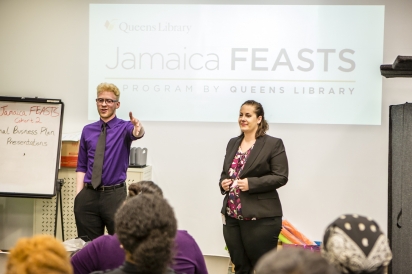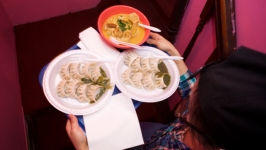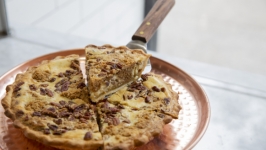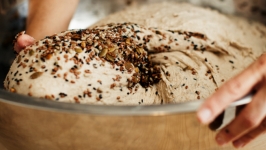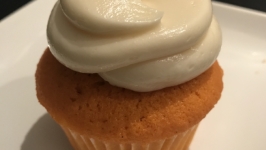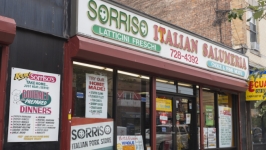Tools of the Trade
One Sunday in late April, anyone who wandered down to the tweedy, subterranean auditorium of the Queens Central Library in Jamaica lucked into a pretty fantastic lunch. Folding tables offered, among other delicacies, slow-fermented fennel-sesame bread, shrimp empanadas and cold soba tossed with shredded carrots and kimchi. For dessert: tart-sweet tamarind balls, with shiny black seeds to spit out. The entire menu came courtesy of the students onstage, giving their final presentations after completing the inaugural semester of the library’s new food incubator program.
Jamaica FEASTS (Food Entrepreneurship and Services Training Space) is a free 12-week class that demystifies the process of launching a food business, delving into everything from menu planning, permits and small business loans to marketing and back-of-house management. It aims to offer a curriculum so comprehensive that its students can— and hopefully will—become successful food entrepreneurs.
The program emerged as city and state officials set their sights on revitalizing downtown Jamaica. 2015 saw the launch of New York City’s Jamaica NOW Action Plan, a $153 million cash infusion, and in 2016, Jamaica received a $10 million slice of the state’s Downtown Revitalization Initiative, an effort to enliven 10 city centers across the state.
As community organizations gathered local residents’ opinions about how the money should be spent, the idea of bringing in more restaurants and food options came up again and again. With the hope that these new businesses could grow from within the community, and serve rather than squeeze out its current population, the New York City Economic Development Corporation (NYCEDC) put out a call for food incubator proposals.
The Queens Library Job and Business Academy assistant director, Tara Lannen-Stanton, thought the Jamaica branch would be the perfect hosting site for just such a project. She imagined an incubator whose graduates could cook and test recipes in the library’s commercial kitchen (now under renovation for this purpose), and sell their products in its retail café. After securing NYCEDC funding to run through six groups of FEASTS students starting in January 2017, she brought in Morgan Earle, a former Amy’s Bread employee, to serve as program manager, and library entrepreneurship counselor Michael Maldonado as lead teacher. The program also incorporates guest lectures from business, real estate, finance and HR professionals.
In choosing the first class of 15 students from a pool of 130 applicants, Earle looked for food experience and a clear plan. “It’s important to know what the food industry takes from you in time and spirit,” she said, noting that participants need firsthand understanding of what it’s like to cook on their feet for 14 hours. Most students are Queens-based, and they’re encouraged to explore Jamaica as a possibility for future endeavors.
The inaugural FEASTS students have ideas as creative as their backgrounds are diverse. A Nigerian man who cooked in Japan for 20 years plans to open a Japanese-African fusion restaurant. A Barbadian baker wants to run a restaurant with a revolving cast of international moms cooking specialties from their home countries. When a Puerto Rican-Dominican-Trinidadian couple couldn’t find a wedding caterer to represent their uniting backgrounds, they cooked their own feast and subsequently started their own at-home catering company, CaSpanish. Now they’d like to expand to a food truck, and eventually a brick-and-mortar restaurant. Other students want to cook soul food and start supper clubs, bottle probiotic Korean sauces, open a Jamaica-based juice bar for a downtown starved of healthy options.
In the classroom, Maldonado’s teaching style is breezy and conversational, incorporating plenty of class participation and group work, while Earle offers frequent anecdotes from her past life in food service. Well-versed in each student’s business idea, they’re quick to point out moments of relevance (“This applies to what you’re doing with ice cream, right?”) and to break from preaching the hard truths of running a food business to indicate the resources that make it possible (“There are free classes for everything”).
Queens being Queens, the marketing session covered tailoring customer service to the borough’s global audience—understanding, for example, that people of one culture may prize eye contact while others avoid it. “It is crucial,” read the lesson’s PowerPoint, “to be inclusive of all customers in words, actions and body language.”
Throughout the semester, Earle was impressed to see students negotiate train delays and life commitments to show up consistently for a five-hour-long Sunday class. Still, not everyone made it to the final presentation: a pair planning a social-justice-minded coffee shop decamped to New Orleans, and the Nigerian-Japanese restaurant hopeful is temporarily waylaid with visa issues.
But many others are putting plans into motion. Bliss Street Creamery, run by student Tavia Kowalchuk, just debuted its ice cream at Taste of Sunnyside. Tamarind-ball purveyor Tress Walker is selling sweet and savory island snacks at the Queens International Night Market under the name Mums Kitchens, saving up for her future kitchen full of moms. Heritage grain enthusiast Tim Graedon is honing his business and baking skills with a new job at Amy’s Bread, as he works on getting his own loaves into Queens greenmarkets. Onstage, he summed up his FEASTS experience to his classmates’ roaring applause: “This program has literally changed my life.”
Queens Central Library | @queenslibrary
Jamaica FEASTS
Jamaica NOW Action Plan
New York City Economic Development Corporation
Tara Lannen-Stanton | @taraLSF
Amy’s Bread | @amysbread
CaSpanish | @caspanish
Bliss Street Creamery | @blissstreetcreamery
Taste of Sunnyside
Queens International Night Market
Mums Kitchens | @mumskitchensnyc


